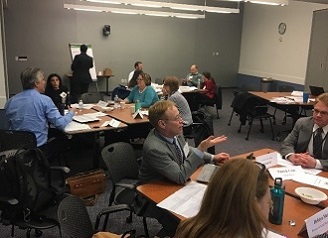Implementing Eco-Logical Accomplishments and Future Application Peer Exchange | January 2018
SHRP2 Implementing Eco-Logical Peer Exchange Report Out | January 11, 2018 | Washington, D.C.

Peer Exchange Purpose
To engage with a group of Eco-Logical practitioners (Federal, state, and regional) to review accomplishments under the program to date, and discuss a vision for Eco-Logical’s future.
Eco-Logical and SHRP2
Through the Second Strategic Highway Research Program (SHRP2) C06 Implementing Eco-Logical program. C06 assists with implementation of the Integrated Ecological Framework (IEF), a nine-step, science-based process that helps practitioners identify ecological priorities within a region and make timely decisions about highway enhancements, enabling mutually-beneficial solutions for transportation and the environment.
Peer Exchange Facts
- 2 moderators representing the Federal Highway Administration (FHWA)
- 2 Implementation Assistance Program (IAP) grant recipients presenting on agency successes with Implementing Eco-Logical
- 22 participants from local, state and Federal transportation and resource protection agencies (including FHWA liaisons), universities, and NGOs
Major Themes
Implementing Eco-Logical Program Review

- SHRP2 development of the IEF
- 2012 Strategic Plan for Eco-Logical involved goals to develop incentive and support to implementing agencies, as well as developing technical assistance, a business case, and new tools and technologies.
- SHRP2 assisted in spreading the adoption of Eco-Logical, which is now widespread across state and local agencies.
- 2015-2016 evaluation of the Eco-Logical program yielded insights into challenges and successes of implementing Eco-Logical in the field, and recommendations for future action to advance the landscape scale approach.
Recognition of IAP Recipient Accomplishments

From right to left: David Williams (FHWA), IAP recipient Kate Zielke (NCTCOG), Mike Ruth (FHWA), and Kate Kurgan (AASHTO)
Two IAP Recipients were recognized for their accomplishments with the presentation of an Implementation Assistance Program Award for excellence in applying and promoting the Eco-Logical approach. Each recipient was then provided an opportunity to present on their project, including successes and challenges with adopting and implementing the program.
- North Central Texas Council of Regional Governments (NCTCOG)
- Kate Zielke presented on the history of NCTCOG’s involvement with the IAP program, developing and applying an IEF to the Loop 9 Southeast Corridor in an area with dense transportation infrastructure and critically important ecological value.
- Ms. Zielke described challenges to updating a Regional Ecosystem Framework (REF) with fragmented datasets and attempting to work from a regional perspective in diverse regulatory and administrative structures.

From right to left: David Williams (FHWA), IAP recipient Judy Gates (Maine DOT), Mike Ruth (FHWA), and Kate Kurgan (AASHTO)
- Maine Department of Transportation (Maine DOT)
- Judy Gates gave an overview of Maine DOT’s journey working through the In-Lieu Fee process and building connections between resource agencies and staff.
- Working through the Eco-Logical process allowed Maine DOT to change internal and external processes, develop an Atlantic Salmon Programmatic Biological Opinion which reduced permitting times, and to change the working relationships between actors in the project development process.
Breakout Session: Discussing Needs and Next Steps for Eco-Logical

Participants divided into small groups and discussed needs and next steps to advance the successful adoption and implementation of Eco-Logical across the country. Each group was tasked with a different topic, based on findings from the IAP evaluation. This includes:
- Building and Sustaining Partnerships
- Institutionalizing Eco-Logical in Agency Practices
- Quantifying Benefits and Communicating Results
- Data, Tools, and Strategies
Full Group Discussion: Future of Eco-Logical
- Building and Sustaining Partnerships
- Participants identified a need for user tools to facilitate outreach on behalf of Eco-Logical; ways to use training opportunities in a cross-agency setting to foster relationship building and exchange of expertise; and need to identify local institutions to champion Eco-Logical practices and continue carrying awareness of the approach moving forward.
- Institutionalizing Eco-Logical in Agency Practices
- Feedback included the need for branding programs and projects as Eco-Logical to improve recognition/branding; the need to encourage management adoption of Eco-Logical as a part of agency trainings and culture; and ways to identify and foster the next generation of champions.
- Quantifying Benefits and Communicating Results
- Participants noted that current data recording Eco-Logical benefits are primarily qualitative, and that quantitative data collection strategies are needed; in addition, the group discussed methods of implementing ‘scorecards’ to track progress on quantitative measures and ways to encourage up-front communication on data needed for evaluation.
- Data, Tools, and Strategies
- Data currency was a topic identified as challenging in continuing the implementation of Eco-Logical, as well as the need for partnerships to collect data and establish a framework for data collection and use. Participants also discussed the need for more technical assistance and training on data topics, with the suggestion of one day ‘add-ons’ to existing conferences like the Transportation Research Board and Integrative Graduate Education and Research Traineeship.
Potential Action Items
- Utilize existing training arms from signatory agencies to promote Eco-Logical.
- Require new staff to learn the Eco-Logical approach as a part of onboard training.
- Focus on building new champions through mentoring, training and recognition.
- Partner with academia to develop cross-education curricula with Eco-Logical principles.
- Create a project scorecard program to evaluate incorporation of Eco-Logical into projects.
- Create an Eco-Logical training module for dissemination.
Summary and Next Steps
- As SHRP2 winds down, Eco-Logical will need to take on a new form, including relying more on the outreach and advocacy of current champions.
- Moving forward, FHWA will draft a framework/action plan for Eco-Logical based upon the discussions here today. The draft plan will be shared with participants.
- FHWA thanked participants for their support throughout the Eco-Logical program, noting that the advocacy and hard work of champions is what has made Eco-Logical a success and enabled positive changes in transportation planning and ecosystem protection.
Need to request technical assistance for your Eco-Logical program? Please submit a request.

